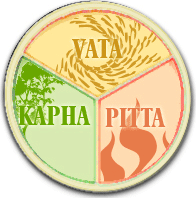If air and space were the predominant energies present during your birth then you are Vata in nature, if water and earth were predominant, you are Kapha and if fire and water were predominant then you are Pitta.
Knowing your dosha can help you understand what activities, foods, and lifestyle elements can support and nurture your health and what can cause imbalance.
The most accurate way of learning your constitution is to visit an Ayurvedic doctor. He or she can conduct a physical examination including pulse assessment and can tell you what your dosha is and provide specific recommendations. Many people are a combination of two doshas.
Instructions
Print out this page. Check off beside each statement that applies to you. When you are finished, count the total for each section (type A, B or C)
Type A
- Thin build and small-boned. Can be tall or short.
- Prominent joints, don’t put on weight easily
- Skin is dry, chaps easily, rough, cool, prominent veins
- Hair is coarse and dry
- Small, active, dark eyes
- Lips are thin, dry, chap easily
- Brittle, ridged or cracked nails
- Little strength, tires easily
- Variable appetite, can get very hungry
- Very physically active
- Bowel movements irregular, hard, dry
- Mind is active, restless
- Tendency toward fear or anxiety when under stress
- Recent memory is good, long-term memory is poor
- Light sleeper
[liCold hands and feet, little perspiration
- Dreams are fearful, flying, movement
- Tendency towards constipation, anxiety, nervousness, poor sleep
- Medium build
- Moderate body weight, may be athletic, muscular
- Oily skin, warm, sensitive skin, reddish, inflamed
- Hair is fine, oily, may have balding or premature graying
- Medium, penetrating, light sensitive eyes
- Lips are soft, medium-sized
- Soft and flexible nails
- Medium strength
- Strong appetite, irritable if you miss a meal or can’t eat when you’re hungry
- Enjoys physical activity, especially competitive
- Bowel movements easy and regular, soft, oily and loose
- Mind is focused and sharp
- Tend toward anger, frustration or irritability when under stress
- Excellent memory
- Usually sleep well
- Good circulation, perspire frequently
- Dreams fiery, angry, violence, passionate
- Tendency towards inflammation, high blood pressure, hypersensitive, aggression
- Thick, ample or stocky build. Larger bone-structure.
- Overweight
- Thick skin, cool, prone to acne
- Thick hair, shiny, lustrous
- Large, round eyes with thick eyelashes
- Lips are large, smooth, full
- Strong and thick nails
- Strong, good endurance
- Less active, sometimes lethargic
- Bowel movements thick, oily, heavy, slow
- Mind is calm and slow
- Tendency to avoid situations that are difficult
- Memory is slow but sustaining
- Sound, heavy sleeper
- Moderate perspiration
- Dreams peaceful, romantic, water, ocean
- Tendency towards respiratory congestion, water retention, lymph congestion, cystic acne, tiredness
If you selected mostly A, you are Vata
- Vata types tend to be fast, wiry and creative types.
- The Vata's primary organ is the colon.
- You need routine in your life to ground your moving energy.
- Travel, especially air travel, can imbalance a Vata.
- Vata's are aggravated by cold, frozen or dried foods.
Maintaining a regular routine is important.
If you selected mostly B, you are Pitta
- Pitta types are determined and strong willed with good digestion.
- The Pitta's primary organs are the small intestine and stomach
- Pitta's tend to be hot, oily, and light.
- Pitta is associated with the fire element, and tend to have a fiery quality.
- When a Pitta becomes imbalanced, he or she may notice skin rashes, burning, inflammation, fever, ulcers, anger, jealousy, copious urine.
In order to be balanced, Pitta's should remain cool, avoiding excess heat, steam or humidity. They should also avoid excessively oily food or fried foods as well as caffeine, alcohol, red meat, hot spices, or salt, choosing instead to eat fresh fruits and vegetables and whole grains.
Pitta types should also try to get plenty of fresh air. Expression of emotions is also important.
If you selected mostly C, you are Kapha
- Kapha types have good endurance, strength and stamina.
- Although it is easy for you to follow routine, it is healthier for you to periodically break from routine.
- You tend toward inertia and tend to attach to people or things.
- Food and security are important to you.
- The primary organ is the chest.
- Kapha is often correlated with the production of mucus.
- Kapha types have a tendency towards congestion, sinusitis, slugishness, weight gain, diabetes or water retention.
Kapha types should allow excitement, change and challenge to become a regular part of their lives.
Note: If you have marked two constitutions nearly equally, you may be a combination.
The most accurate way of learning your constitution is to visit an Ayurvedic doctor. He or she can conduct a physical examination including pulse assessment and can tell you what your dosha is and provide specific recommendations. Many people are a combination of two doshas.

No comments:
Post a Comment